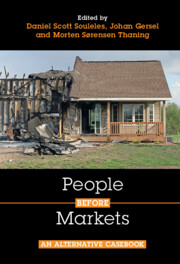Book contents
- People Before Markets
- People Before Markets
- Copyright page
- Dedication
- Contents
- Contents by Topic
- Authors
- 1 Introduction: Why Are You Here?
- 2 Some Philosophical Help with “Neoliberalism”
- Part I Our World
- 3 Where Should Food Come From?
- 4 Where Should Water Come From?
- 5 Who Gets to Own Land?
- 6 How Should Food be Produced?
- 7 Who Decides Where They Live?
- 8 How Much Land Do We Need?
- 9 Where Should We Park?
- 10 How Should We Deal with Climate Change?
- 11 How Should We Make an Impact?
- Part II Our Lives
- Part III Our Work
- Index
- References
5 - Who Gets to Own Land?
from Part I - Our World
Published online by Cambridge University Press: 27 October 2022
- People Before Markets
- People Before Markets
- Copyright page
- Dedication
- Contents
- Contents by Topic
- Authors
- 1 Introduction: Why Are You Here?
- 2 Some Philosophical Help with “Neoliberalism”
- Part I Our World
- 3 Where Should Food Come From?
- 4 Where Should Water Come From?
- 5 Who Gets to Own Land?
- 6 How Should Food be Produced?
- 7 Who Decides Where They Live?
- 8 How Much Land Do We Need?
- 9 Where Should We Park?
- 10 How Should We Deal with Climate Change?
- 11 How Should We Make an Impact?
- Part II Our Lives
- Part III Our Work
- Index
- References
Summary
The control and ownership of land is one of the surest ways to generate wealth. Moreover, if you own land or treat it as property, you can accumulate it and bequeath it to whomever you like, creating large inter-generational holdings of wealth. This is often why, when revolutions happen, one of the first questions that come up is about land, its ownership, and its potential redistribution. In this chapter, Bafford looks at what happened to land ownership across a number of revolutions in Zimbabwe and South Africa. Bafford identifies how predominantly white landowners in South Africa were able to keep their wealth. They did so with the help of property-protecting neoliberal statecraft that prioritized the protection of the existing regime of property rights rather than challenging inequality of land ownership. In Zimbabwe white landowners lost many of their holdings. Still, Bafford goes on to show the way that international, neoliberal governing organizations punished Zimbabwe’s attempt at racial restorative justice with reference to the protection of property rights and the free flow of investement capital.
Keywords
- Type
- Chapter
- Information
- People before MarketsAn Alternative Casebook, pp. 95 - 116Publisher: Cambridge University PressPrint publication year: 2022

